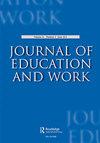‘We are all in the same storm but not in the same boat’: the COVID pandemic and the Further Education Sector
IF 1.7
Q2 EDUCATION & EDUCATIONAL RESEARCH
引用次数: 0
Abstract
ABSTRACT The quotation in the title from a college leader is a stark reflection of the experience of the Further Education (FE) Sector during the COVID pandemic (2020–21). Traditionally regarded as a poor relation of the English education system, evidence from Sector sources suggest that the five COVID harms identified through a scoping review of the latest research closely mirror the main social and educational features of English general FE colleges. The pandemic has led to longer-term harms on vocational learning, with major disruptions to college-based courses and to apprenticeships, a stagnation situation captured in the metaphor ‘educational long-COVID’. The analysis conceptualises the impact of the pandemic on FE provision and learners as leading to a ‘COVID learning and skills equilibrium’; whereas effective mitigations are conceptualised through the idea of ‘COVID recovery ecosystems’. Rapid review evidence suggests that the most effective way of addressing system-wide disruption is the development of integrated, strategic actions at local and regional levels to address vocational learning losses, facilitate greater entry-to-employment and to create more job opportunities for young people. Without these longer-term measures it is likely that the negative effects of the pandemic on the FE Sector could become further entrenched.“我们都在同一场风暴中,但不在同一条船上”:COVID大流行和继续教育部门
摘要标题中引用了一位大学领导的话,这清楚地反映了新冠肺炎疫情期间(2020-2021年)继续教育部门的经历。传统上被认为是英国教育系统的不良关系,来自部门来源的证据表明,通过对最新研究的范围审查确定的五种新冠肺炎危害密切反映了英国普通FE学院的主要社会和教育特征。疫情对职业学习造成了长期危害,对大学课程和学徒制造成了重大干扰,这是“教育长期新冠肺炎”这一比喻中的停滞局面。该分析将疫情对FE提供和学习者的影响概念化为导致“新冠肺炎学习和技能平衡”;而有效的缓解措施是通过“新冠肺炎恢复生态系统”的理念来概念化的。快速审查的证据表明,解决全系统混乱问题的最有效方法是在地方和区域各级制定综合战略行动,以解决职业学习损失问题,促进更多人就业,并为年轻人创造更多就业机会。如果没有这些长期措施,疫情对FE行业的负面影响可能会进一步根深蒂固。
本文章由计算机程序翻译,如有差异,请以英文原文为准。
求助全文
约1分钟内获得全文
求助全文
来源期刊

Journal of Education and Work
EDUCATION & EDUCATIONAL RESEARCH-
CiteScore
2.70
自引率
14.30%
发文量
40
期刊介绍:
The Journal of Education and Work is an international forum for academic research and policy analysis which focuses on the interplay of the education and economic systems. The journal examines how knowledge, skills, values and attitudes both about and for work and employment are developed within the education system. The journal also explores the various forms of industrial training and accreditation in the economic system, including changes in the economic and industrial infrastructure which influence the type of employees required. Work in the informal economy is also included.
 求助内容:
求助内容: 应助结果提醒方式:
应助结果提醒方式:


